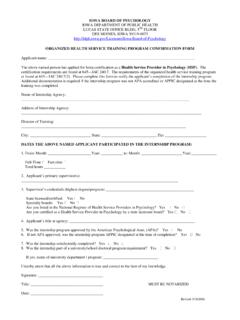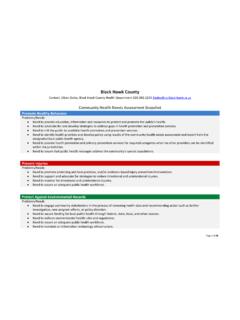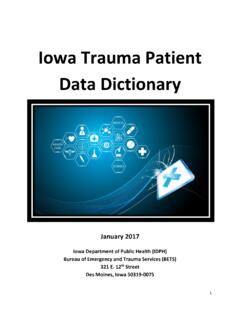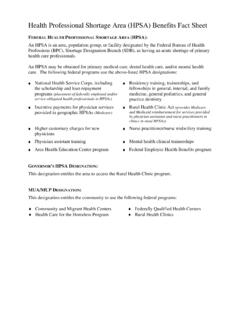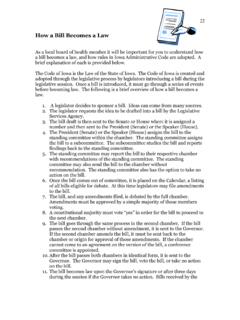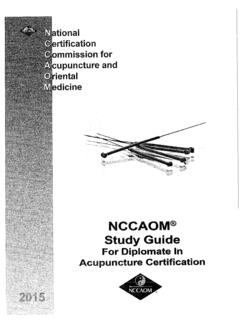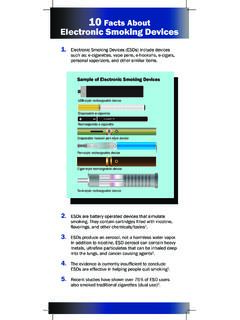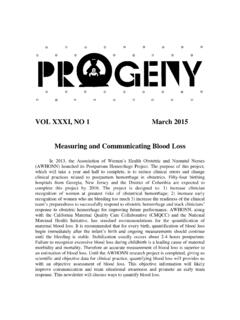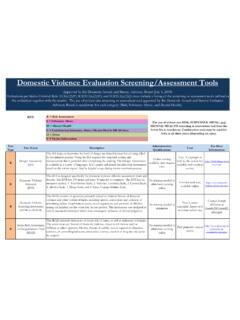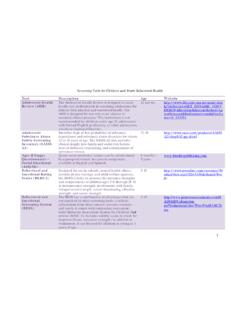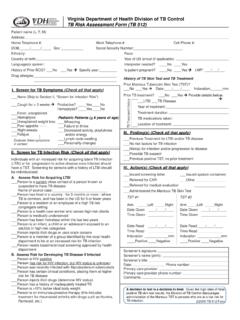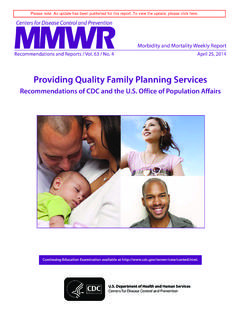Transcription of Mental Health Screening Form III - Iowa Department of ...
1 Guidelines for Using the Mental Health Screening Form III The Mental Health Screening Form-III (MHSF-III) was initially designed as a rough Screening device for clients seeking admission to substance abuse treatment programs. Each MHSF-III question is answered either yes or no. All questions reflect the respondent s entire life history; therefore all questions begin with the phrase Have you The preferred mode of administration is for staff members to read each item to the respondent and get their yes and no responses. Then, after completing all 18 questions (question 6 has two parts), the staff member should inquire about any yes response by asking When did this problem first develop? ; How long did it last? ; Did the problem develop before, during, or after you started using substances?
2 ; and, What was happening in your life at that time? This information can be written below each item in the space provided. There is additional space for staff member comments at the bottom of the form. The MHSF-III can also be given directly to clients for them to complete, providing they have sufficient reading skills. If there is any doubt about someone s reading ability, have the client read the MHSF-II instructions and question number one to the staff member monitoring this process. If the client can not read and/or comprehend the questions, the questions must be read and/or explained to him/her. Whether the MHSF-III is read to a client or s/he reads the questions and responds on his/her own, the completed MHSF-III should be carefully reviewed by a staff member to determine how best to use the information.
3 It is strongly recommended that a qualified Mental Health specialist be consulted about any yes response to questions 3 through 17. The Mental Health specialist will determine whether or not a follow-up, face-to-face interview is needed for a diagnosis and/or treatment recommendation. The MHSF-III features a Total Score line to reflect the total number of yes responses. The maximum score on the MHSF-III is 18 (question 6 has two parts). This feature will permit programs to do research and program evaluation on the Mental Health -chemical dependence interface for their clients . The first four questions on the MHSF-III are not unique to any particular diagnosis; however, questions 5 through 17 reflect symptoms associated with the following diagnoses/diagnostic categories: Q5, Schizophrenia; Q6, Depressive Disorders; Q7, Post-Traumatic Stress Disorder; Q8, Phobias; Q9, Intermittent Explosive Disorder; Q10, Delusional Disorder; Q11, Sexual and Gender Identity Disorders; 12Q Eating Disorders (Anorexia, Bulimia); Q13 Manic Episode; Q14 Panic Disorder; Q15 Obsessive-Compulsive Disorder; Q16 Pathological Gambling; Q17 Learning Disorder and Mental Retardation.
4 The relationship between the diagnoses/diagnostic categories and the above cited questions was investigated by having four Mental Health specialists independently select the one MHSF-III question that best matched a list of diagnoses/diagnostic categories. All of the Mental Health specialists matched the questions and diagnoses/diagnostic categories in the same manner, that is, as we have noted in the preceding paragraph. A yes response to any of questions 5 through 17 does not, by itself, insure that a Mental Health problems exists at this time. A yes response raises only the possibility of a current problem, which is why a consult with a Mental Health specialist is strongly recommended. Carroll, & John J. McGinley, , , 4/2000 by Project Return Foundation, Inc. This material may be reproduced or copied, in entirety, without permission.
5 Citation of the source is appreciated. Mental Health Screening Form III Instructions: In this program, we help people with all their problems, not just their addictions. This commitment includes helping people with emotional problems. Our staff is ready to help you to deal with any emotional problems you may have, but we can do this only if we are aware of the problems. Any information you provide to us on this form will be kept in strict confidence. It will not be released to any outside person or agency without your permission. If you do not know how to answer these questions, ask the staff member giving you this form for guidance. Please note, each item refers to your entire life history, not just your current situation, this is why each question begins Have you ever .. 1) Have you ever talked to a psychiatrist, psychologist, therapist, social worker, or counselor about an emotional problem?
6 YES NO 2) Have you ever felt you needed help with your emotional problems, or have you had people tell you that you should get help for your emotional problems? YES NO 3) Have you ever been advised to take medication for anxiety, depression, hearing voices, or for any other emotional problem? YES NO 4) Have you ever been seen in a psychiatric emergency room or been hospitalized for psychiatric reasons? YES NO 5) Have you ever heard voices no one else could hear or seen objects or things which others could not see? YES NO 6) a) Have you ever been depressed for weeks at a time, lost interest or pleasure in most activities, had trouble concentrating and making decisions, or thought about killing yourself? YES NO b) Did you ever attempt to kill yourself? YES NO 7) Have you ever had nightmares or flashbacks as a result of being involved in some traumatic/terrible event?
7 For example, warfare, gang fights, fire, domestic violence, rape, incest, car accident, being shot or stabbed? YES NO 8) Have you ever experienced any strong fears? For example, of heights, insects, animals, dirt, attending social events, being in a crowd, being alone, being in places where it may be hard to escape or get help? YES NO 9) Have you ever given in to an aggressive urge or impulse, on more than one occasion, that resulted in serious harm to others or led to the destruction of property? YES NO Carroll, & John J. McGinley, , , 4/2000 by Project Return Foundation, Inc. OVER 10) Have you ever felt that people had something against you, without them necessarily saying so, or that someone or some group may be trying to influence your thoughts or behavior? YES NO 11) Have you ever experienced any emotional problems associated with your sexual interests, your sexual activities, or your choice of sexual partner?
8 YES NO 12) Was there ever a period in your life when you spent a lot of time thinking and worrying about gaining weight, becoming fat, or controlling your eating? For example, by repeatedly dieting or fasting, engaging in much exercise to compensate for binge eating, taking enemas, or forcing yourself to throw up? YES NO 13) Have you ever had a period of time when you were so full of energy and your ideas came very rapidly, when you talked nearly non-stop, when you moved quickly from one activity to another, when you needed little sleep, and believed you could do almost anything? YES NO 14) Have you ever had spells or attacks when you suddenly felt anxious, frightened, uneasy to the extent that you began sweating, your heart began to beat rapidly, you were shaking or trembling, your stomach was upset, you felt dizzy or unsteady, as if you would faint? YES NO 15) Have you ever had a persistent, lasting thought or impulse to do something over and over that caused you considerable distress and interfered with normal routines, work, or your social relations?
9 Examples would include repeatedly counting things, checking and rechecking on things you had done, washing and rewashing your hands, praying, or maintaining a very rigid schedule of daily activities from which you could not deviate. YES NO 16) you ever lost considerable sums of money through gambling or had problems at work, in school, with your family and friends as a result of your gambling? YES NO 17) Have you ever been told by teachers, guidance counselors, or others that you have a special learning problem? YES NO Print Client s Name: _____ Program to which client will be assigned: Name of Admissions Counselor:_____ Date: Reviewer's Comments: 2000 by PRF, Rev. 4/2000 Total Score: _____ (each yes = 1 pt.) This material may be reproduced or copied, in entirety, without permission. Citation of the source is appreciated.
10

